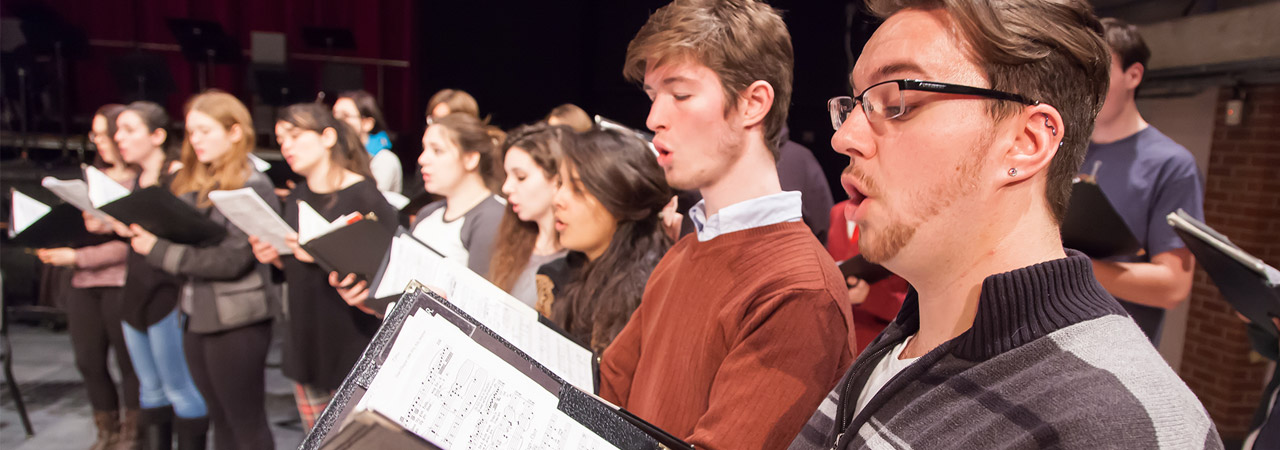
In the 40 years since Laurier's Faculty of Music came into existence, music has changed, how it is disseminated has changed and the way musicians contribute to society has changed.
Recognizing and keeping pace with those changes has kept Laurier's music program a leader in Canada and built on the strong foundation laid by those who founded the faculty, says Glen Carruthers, dean of the Faculty of Music.
“Laurier’s Faculty of Music has positioned itself over the past 40 years as a top music school in Canada," Carruthers says during an interview in his Waterloo office. "While we're celebrating our past achievements with our 40th anniversary, this is also a time to look forward and consider the ways we can continue to be relevant in a world that seems to have change as its only constant."
From the beginning, university leaders were keen to support and foster the growth of a music program, former faculty member Walter H. Kemp writes in I Remember Laurier: Reflections by Retirees on Life at WLU.
"Not only was there the desire but also the natural assumption that music as a performance and academic subject was an integral part of a small liberal arts university," Kemp recalls in the book.
Since 1975, the Faculty of Music has grown from 69 students in one undergraduate program to more than 400 students across seven degree and diploma programs at the undergraduate and graduate levels.
Carruthers says the department's 25 current faculty members are incredibly dedicated and full of creative ideas. In fact, he says, it is faculty members and students who have made Laurier's music program such a success by fostering a supportive, family-like environment.
"If you're in a supportive environment where people are happy there's no limit on what you can do," Carruthers says. "In the Faculty of Music we educate musically, but we educate in a lot of other ways, too. We create opportunities and we open eyes and we open ears."
Carruthers says students undergo a transformative experience during their time in the music program, while also helping keep the program relevant.
"The students often lead layered musical lives," Carruthers says. "There are not a lot of student musicians in the school who have a singular view of what it means to be a musician. Many of them cross all kinds of boundaries. Students have certainly played a big role in curriculum and other developments over the years."

During recent years, the Faculty of Music has placed an increased focus on the discipline of music therapy, which examines the connection between health, well-being and music. The emerging discipline of community music has also gained prominence, with the faculty starting a community music master's program in 2013 and undergraduate program in 2016.
Carruthers says both music therapy and community music are areas of study where Laurier is well-positioned to be at the forefront. He also says that innovative new programs that build on the faculty's strengths are on the horizon, programs that situate music within a wider social context.
In addition to its academic programs, Laurier's Faculty of Music also operates the Laurier Conservatory of Music, which boasts more than 1,000 students, and is the summertime home of the National Youth Orchestra of Canada. As a feather in the faculty's cap, Laurier was named Canada’s Best Music Campus by CBC Radio in 2013.
To celebrate its 40th anniversary, the Faculty of Music presented a series of concerts and events earlier this year on the university’s Waterloo campus, as well as in the Waterloo community. This coming May, the faculty will host the International Community Music Conference, welcoming guests from around the world to explore the impact of music in community settings. In addition, the celebrated Penderecki String Quartet is this year marking its 25th year as quartet-in-residence at Laurier.
Hosting musical events is certainly nothing new for Laurier's Faculty of Music, which presents about 100 public events each year, including a series of lunch hour concerts on the university's Waterloo campus. Whether it be around the corner or around the globe, it's not hard to find someone in the world of music who has an affiliation with Laurier's program.
"It's hard in our community to find an artistic or cultural endeavour that isn’t in some way impacted by the Faculty of Music at Laurier," Carruthers says. "That's true also when you look at arts organizations across Canada and arts organizations internationally. You often don't have to go too far to find a Laurier connection. Our students have impact within the community, beyond the community and throughout the discipline internationally."